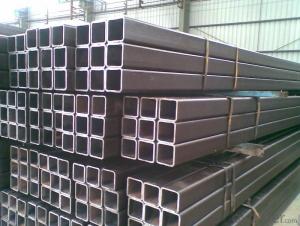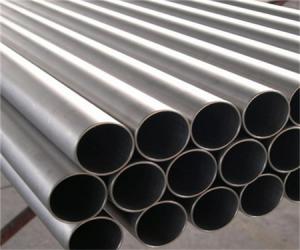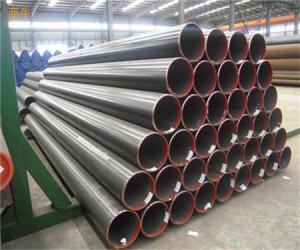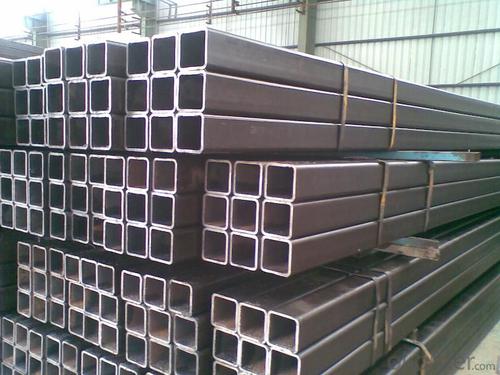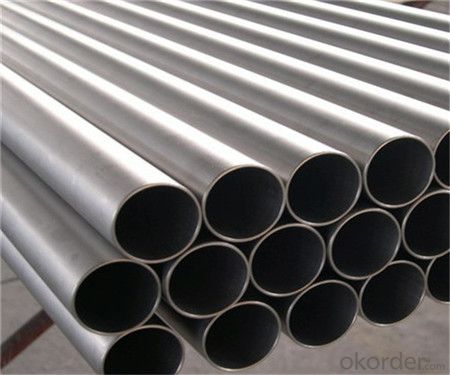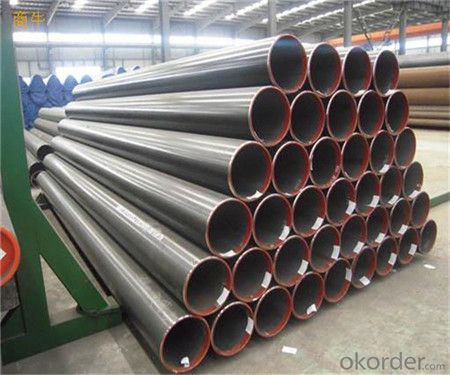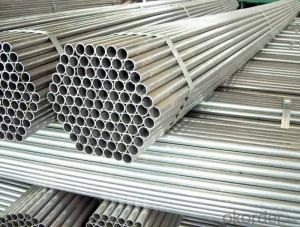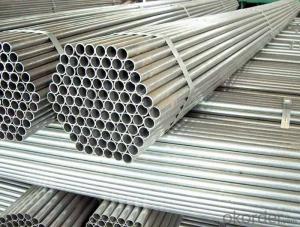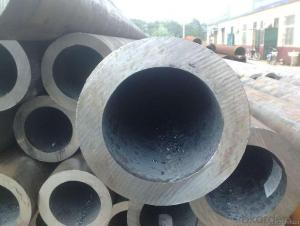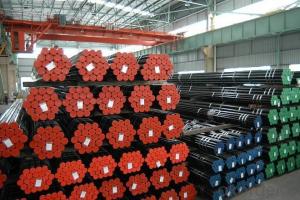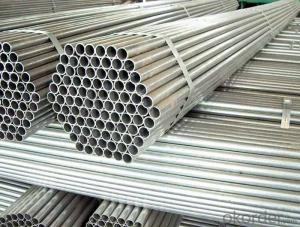Rectangular Steel Pipe BS, JIS, GB, DIN
- Loading Port:
- Tianjin
- Payment Terms:
- TT or LC
- Min Order Qty:
- 20 m.t.
- Supply Capability:
- 15000 m.t./month
OKorder Service Pledge
OKorder Financial Service
You Might Also Like
1、Structure of Pipe :
Seamless pipe is formed by drawing a solid billet over a piercing rod to create the hollow shell. As the manufacturing process does not include any welding, seamless pipes are perceived to be stronger and more reliable. Historically seamless pipe was regarded as withstanding pressure better than other types, and was often more easily available than welded pipe.
2、Main Features of the Pipe :
• High manufacturing accuracy
• High strength
• Small inertia resistance
• Strong heat dissipation ability
• Good visual effect
• Reasonable price
3、 Pipe Specification:
Standard | GB, DIN, ASTM ASTM A106-2006, ASTM A53-2007 |
Grade | 10#-45#, 16Mn 10#, 20#, 45#, 16Mn |
Thickness | 8 - 33 mm |
Section Shape | Round |
Outer Diameter | 133 - 219 mm |
Place of Origin | Shandong, China (Mainland) |
Secondary Or Not | Non-secondary |
Application | Hydraulic Pipe |
Technique | Cold Drawn |
Certification | API |
Surface Treatment | factory state or painted black |
Special Pipe | API Pipe |
Alloy Or Not | Non-alloy |
Length | 5-12M |
Outer Diameter | 21.3-610mm |
Grade | 20#, 45#, Q345, API J55, API K55, API L80, API N80, API P110, A53B |
Standard | ASME, ASTM |
1) Material:20#(ASTM A 106/A53 GRB.API5LGRB,GB),45#,16Mn,10#.
2) Specification range:OD:21.3-610mm,WT:6-70mm,length:6-12m or according to the requirement of clients.
3) Excutive standards:GB,ASME API5L.ASTM A 106/A53,Despite of the above standards,we can also supply seamless steel pipe with standard of DIN,JIS,and so on,and also develop new products according to the requirements of our clients!
4) Surface:black lacquered,varnish coating or galvanized.
5) Ends:Beveled or square cut,plastic capped,painted.
6) Packing:bundles wrapped with strong steel strip,seaworthy packing.
4、Packaging & Delivery
Packaging Details: | seaworthy package,bundles wrapped with strong steel strip |
Delivery Detail: | 15-30days after received 30%TT |
5、FAQ of Pipe:
①How is the quality of your products?
Our products are manufactured strictly according to national and internaional standard, and we take a test
on every pipe before delivered out. If you want see our quality certifications and all kinds of testing report, please just ask us for it.
Guaranteed: If products’ quality don’t accord to discription as we give or the promise before you place order, we promise 100% refund.
②How about price?
Yes, we are factory and be able to give you lowest price below market one, and we have a policy that “ for saving time and absolutely honest business attitude, we quote as lowest as possible for any customer, and discount can be given according to quantity”,if you like bargain and factory price is not low enough as you think, just don’t waste your time.Please trust the quotation we would give you, it is professional one.
③Why should you chose us?
Chose happens because of quality, then price, We can give you both.Additionally, we can also offer professional products inquiry, products knowledge train(for agents), smooth goods delivery, exellent customer solution proposals.Our service formula: good quality+good price+good service=customer’s trust
SGS test is available, customer inspection before shipping is welcome, third party inspection is no problem.
6、 Pipe Images:
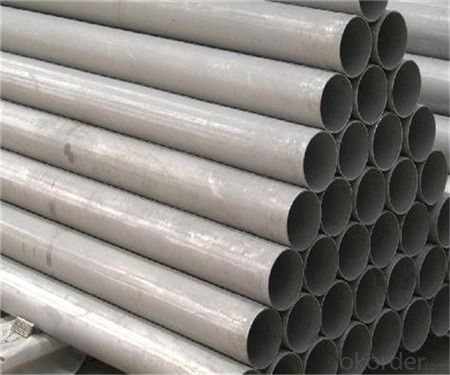
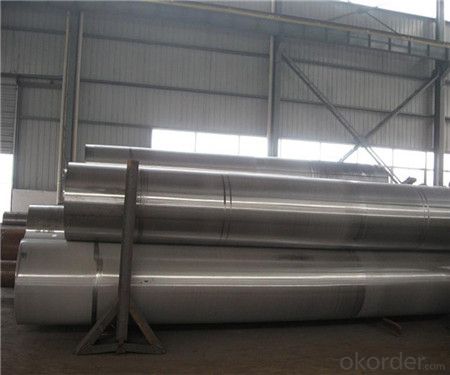
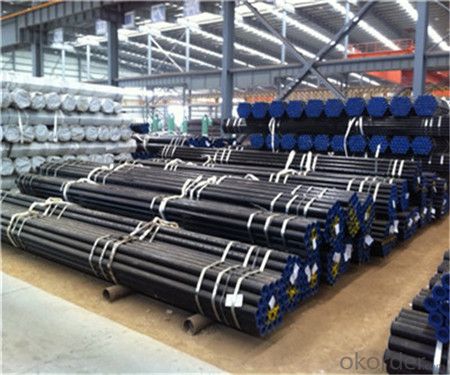
- Q: What is the minimum temperature that steel pipes can handle?
- The minimum temperature that steel pipes can handle depends on the specific grade and composition of the steel. Generally, steel pipes can handle extremely low temperatures without experiencing any significant issues. In fact, many types of steel are specifically designed to withstand extremely cold temperatures, making them suitable for various applications in industries such as oil and gas, construction, and cryogenics. However, it is important to note that at extremely low temperatures, steel may become more brittle, which can affect its mechanical properties. Therefore, it is essential to carefully select the appropriate grade of steel and consider any specific requirements or limitations for the intended application when determining the minimum temperature that steel pipes can handle.
- Q: How are steel pipes used in natural gas processing plants?
- Steel pipes are used extensively in natural gas processing plants for various purposes, including the transportation of natural gas, the transfer of various fluids, and the construction of pipelines and infrastructure. These pipes are highly durable, resistant to corrosion, and can withstand high pressure, making them ideal for safely transporting natural gas and other substances throughout the facility.
- Q: How are steel pipes used in the oil and gas industry?
- Steel pipes are widely used in the oil and gas industry for various purposes. They are primarily used for transporting oil and gas from production sites to refineries and distribution centers. These pipes are known for their strength, durability, and resistance to corrosion, making them ideal for handling the high-pressure and corrosive nature of oil and gas fluids. Steel pipes are also used in drilling operations as casing and tubing to maintain the integrity of the wellbore and prevent any leakage. Additionally, steel pipes are utilized in the construction of oil and gas infrastructure such as pipelines, storage tanks, and offshore platforms, ensuring the safe and efficient transportation and storage of oil and gas resources.
- Q: The outer circle of a seamless steel pipe 50 head into the outer circle of the 40 to close
- According to the metal processing performance, pipe size, quality requirements, as well as investment and benefits to choose different processing methods and corresponding auxiliary processes. The basic process of cold rolling of cold drawn pipe are: (1) tube feeding, the pipe material for hot-rolled finished or semi-finished tube, pipe extrusion pipe and welded pipe; (2) pipe material preparation, including inspection, bundling, pickling, cleaning, washing, drying, neutralization, grease and so on; (3) cold processing (cold or cold); (4) finished finishing finished including heat treatment, straightening, sampling, end cutting, inspection (manual inspection and various testing), pressure test, oiling, packaging and warehousing etc.. Different products are refined and the content varies.
- Q: Are steel pipes suitable for potable water applications?
- Yes, steel pipes are suitable for potable water applications. Steel pipes are commonly used for transporting water in various industries and municipal water systems. They are known for their durability, strength, and resistance to corrosion, making them a reliable choice for potable water systems. Steel pipes also have the advantage of being able to withstand high pressure and temperature conditions, making them suitable for both hot and cold water applications. Additionally, steel pipes can be easily welded, ensuring leak-free connections. However, it is important to note that the quality of the steel used and proper maintenance are crucial factors in ensuring the safety and suitability of steel pipes for potable water applications. Regular inspection and maintenance should be done to prevent corrosion and ensure the integrity of the pipes.
- Q: What is the role of steel pipes in HVAC systems?
- Steel pipes are essential components in HVAC systems as they are used to transport hot or cold water, steam, and air throughout the system. They provide a reliable and durable conduit for the distribution of heating, ventilation, and air conditioning, ensuring efficient and effective operation of the system.
- Q: How are steel pipes used in the marine industry?
- Steel pipes are commonly used in the marine industry for various applications such as transportation of fluids, structural support, and offshore drilling. They are used for the construction of ships, offshore platforms, and pipelines, as they possess high durability, strength, and corrosion resistance. Additionally, steel pipes are used for cooling systems, ballast transfer, and other critical functions required in marine engineering.
- Q: How to distinguish seamless pipe and welded pipe?
- If it is seamless pipe, the port can be seen inside and outside the pipe there is no welding meat exists, and even if the welding pipe welding processing, the pipe weld is very easy to observe.
- Q: What is the difference between steel pipes and concrete-lined pipes?
- The main difference between steel pipes and concrete-lined pipes lies in their composition and protective features. Steel pipes are typically made entirely of steel, providing strength and durability. On the other hand, concrete-lined pipes consist of a steel pipe coated with a layer of concrete. This lining offers additional protection against corrosion and abrasion. While steel pipes are more suitable for high-pressure applications and offer better resistance to external factors, concrete-lined pipes are commonly used in wastewater systems to prevent corrosion and extend the lifespan of the pipe.
- Q: Where is a steel pipe casing usually used?
- A straight tube of carbon steel sheathed on pipes and tubes and threading tubes to protect the joints from damage by electric welding. The purpose is to protect the wires and cables.
Send your message to us
Rectangular Steel Pipe BS, JIS, GB, DIN
- Loading Port:
- Tianjin
- Payment Terms:
- TT or LC
- Min Order Qty:
- 20 m.t.
- Supply Capability:
- 15000 m.t./month
OKorder Service Pledge
OKorder Financial Service
Similar products
Hot products
Hot Searches
Related keywords
